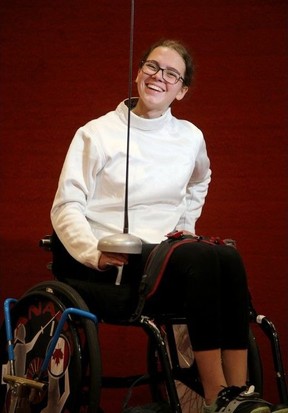In 2018, Trinity Lowthian’s rare disease was so bad she was just focused on staying alive. In 2024, she’s set to fence for Canada.

Article content
Inside the Ottawa Fencing Club, 22-year-old Trinity Lowthian straps into her wheelchair and picks up her épée. As she gazes forward, all sights are set on the 2024 Paralympic Games.
While she’s only been fencing for two years, she’s quickly climbed the ranks to become eighth best in the world in épée.
Soon, she will represent Canada on the world’s biggest international stage.
Advertisement 2
Story continues below
Article content
Lowthian said she has always dreamed about competing at the Olympics. She excelled in endurance sports such as water polo and biathlon while growing up in Stittsville.
But in 2018, Lowthian couldn’t eat and drink enough nutrients to sustain herself. She became increasingly malnourished and was unable to attend school or play sports. Her sole focus was staying alive.
“At first I kind of brushed it off, but then it kept getting worse,” Lowthian said. “I had to pull back on some of the sports I was doing, just because I wasn’t able to eat enough. I didn’t have enough energy. I was losing weight and not feeling great.”
It’s honestly crazy just thinking about even two years ago where I was at, let alone five years ago. In those days … I couldn’t imagine a future in anything.
Trinity Lowthian
“Now we have conversations about the two or three people in the world that she hasn’t beaten yet, and everyone else she feels confident she can beat them,” ApSimon said. “It’s amazing that within two years, we’re having that conversation of … how to beat the Paralympic champion.”
After spending countless nights in the hospital over several years, Lowthian was diagnosed with autoimmune autonomic neuropathy — a rare disease that impacts the nervous system’s ability to control involuntary bodily functions, including digestion.
Advertisement 3
Story continues below
Article content

“Every morning (in the hospital), Trinity would set her alarm for 7 a.m. and she would be dressed before the nurses came in, no matter how much of a struggle it was, because she wasn’t going to be the sick kid,” said Lowthian’s mother, Heather Trail.
Lowthian is currently connected to a Total Parenteral Nutrition (TPN) which pumps broken-down nutrients through a line to her bloodstream.
Lowthian said she often dreamed of reconnecting with her competitive side during her stays in the hospital, but never knew whether she would be physically able. In 2022, two bouts of meningitis limited her lower-body mobility and increased her reliance on a wheelchair.
“I knew I needed (a sport) that is a bit more realistic for my body, that’s a bit shorter, maybe a bit more mental than physical,” she said. “I thought fencing would be a good avenue for that.”
She contacted the Ottawa Fencing Club and started training with coach Paul ApSimon in May 2022. From the first practice, she said fencing instantly satisfied her desire for competition.
“I went the first night, and I was like, ‘I’m going to do this.’ I went from zero to 100 right there.”
Advertisement 4
Story continues below
Article content
ApSimon, who has coached professional fencing for over 30 years, said he immediately noticed something special in Lowthian.
“Within the first five minutes, we realized how well she was moving her upper body and how flexible and agile she was,” he said.
On top of her studies in nutrition sciences at the University of Ottawa, Lowthian trains four to five times a week. As the only para-fencer at the Ottawa Fencing Club, she spars against able-bodied fencers sitting down in a wheelchair fixed to the ground across from her.
“Before sitting down to fence me, lots of people think it’s not going to be as hard as standing fencing,” Lowthian said. “But afterwards, they always have a reaction of how it is way harder than they thought it was.”

“Because you’re at such a fixed distance in wheelchair fencing, you can never run away,” she added. “It’s all in your upper body.”
Given the lack of wheelchair fencing infrastructure and competition in Canada, Lowthian began competing internationally to gain experience against other wheelchair fencers.
Her first competition was in Brazil at the Pan-American Wheelchair Fencing Championships in October 2022, five months after she started the sport. She instantly found success and won four medals.
Advertisement 5
Story continues below
Article content
ApSimon said he’s never seen a fencer progress so quickly — especially against significantly more experienced competition. Some fencers in the circuit have competed as long as Lowthian has been alive.
“Now we have conversations about the two or three people in the world that she hasn’t beaten yet, and everyone else she feels confident she can beat them,” ApSimon said. “It’s amazing that within two years, we’re having that conversation of … how to beat the Paralympic champion.”
As she looks ahead to the Paralympics, Lowthian is set to compete in sabre and épée from Sept. 3 to 8 at the Grand Palais in Paris.
She said she’s competing to show a younger version of herself just how much she’s overcome.
“It’s honestly crazy just thinking about even two years ago where I was at, let alone five years ago,” she said. “In those days … I couldn’t imagine a future in anything. I would like to go back and show younger me that it gets better.”
Recommended from Editorial
Article content


Comments